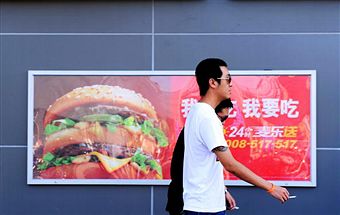The Price of Tea in China
Food prices are rising in China. For us higher food prices mean we get fat a little more slowly; for a poor Chinese family it means starvation stalks a little closer.

The Chinese government will act to slow the increase in food prices being felt in the country:
(Reuters) – China will unveil food price controls and crack down on speculation in agricultural commodities to contain inflationary pressure that its central bank governor highlighted as a risk on Tuesday.
With consumer prices rising at their fastest pace in more than two years, the National Development and Reform Commission, the country’s top planning agency, is preparing a “one-two punch” of actions to rein in food costs, official media reported.
Such direct intervention would mark an escalation of the government’s efforts to tame inflation and underline its worries over the rapid run-up in food prices.
Possible steps include price controls, subsidies for shoppers, a crackdown on hoarding and price gouging as well as a system whereby mayors are made responsible for a basket of food items, the China Securities Journal reported.
Those found speculating on corn or cotton will also be punished severely, it added.
“Price increases, particularly overly rapid food price increases, are the main economic problem faced by the country at present,” the report cited an unnamed source as saying.
“The policies that are being considered aim to contain the momentum and will be delivered in combination as a one-two punch,” it added.
Consumer price inflation sped to a 25-month high in October, with prices rising 4.4 percent from a year earlier. Food, which makes up about a third of China’s consumer price index, led the way, climbing 10.1 percent. Non-food items increased just 1.6 percent.
Don’t believe that 4.4% figure, by the way. A researcher at the Chinese Academy of Sciences has found that the Chinese authorities have been systematically underestimating and underreporting inflation there:
A major flaw in the current indexing system, experts say, revolves around the fact that the proportions given each component fail to adequately paint an overall picture of consumer price fluctuations. Some also argue that spending on housing should be more accurately rendered, and consumption by the wealthy more closely tracked.
CPI component weights are based on what NBS considers a proper proportion of household consumption rates for various types of goods and services relative to total household consumption.
[…]
Zeng Wuyi, a professor at Xiamen University and deputy chairman of the National Statistics Society of China, thinks the survey method may be hobbled by sampling errors. Overall, he says, survey results tend to favor a CPI that may be lower than real inflation.
In addition, Zeng said, the system of collecting consumption figures may tilt too heavily toward low-income groups. Wealthy and poor families do not spend the same way; low-income families, for example, spend a higher proportion of their income on food.
“The higher weighting of food in the CPI may be related to this,” said Zeng.
NBS official Wang Youjuan, who works in the Urban department’s Households Division, admits the survey has shortcomings in terms of consumers surveyed. For example, he noted that high-income earners typically refuse to fill out questionnaires, which means consumption figures are skewed toward middle- and low-income groups.
Hat tip: Business Insider
An additional perennial problem with deriving good economic intelligence in China is that local officials, generally responsible for data collection in their areas, have strong incentives to report good news. When scores of thousands of reports are being shaved a little here and a little there it makes a hash of results.
Consequently, when you hear “4.4% inflation” in China, think closer to 7%. Or even higher:
A woman selling eggs at a Carrefour supermarket in Beijing said that eggs had risen to 1.2 renminbi, or 18 cents, each from 0.90 renminbi during the summer. At the supermarket’s deli stand, another saleswoman said that prices for processed foods were stable but that prices for fresh food were climbing quickly, with potato prices nearly doubling this autumn.
A nearby shopper joined the conversation, remarking that “the news said it is because farmers are holding potatoes from the market, just like the real estate market — that’s why the price is so high. It is not real.”
While “price controls, subsidies for shoppers, a crackdown on hoarding and price gouging” may convince ordinary Chinese people that the government is acting swiftly to deal with situation and, consequently, increase harmony within China, it’s unlikely that those actions will do a great deal to give poor Chinese consumers for whom food costs consume 30% of their income actual relief. Historically, those actions have been more successful at creating shortages than they have at reducing prices.
The reasons that food prices are increasing in China are many and include greater wealth enabling greater consumption, an increasing population, and issues with crop yields. However, China’s pegging of the yuan to the dollar means that as the dollar loses in value so does the yuan and that, too, may be a cause of increasing food prices.
To whatever extent the Federal Reserve’s policy of quantitative easing results in higher commodity prices and to whatever extent that, in turn, results in higher food prices in China, it could hardly have come at a worse time for China. Which may go some way to explain the reactions of Chinese people to the U. S. policy.
Above, the price of a Big Mac in China has risen from 14 to 15 RMB, via Financial Times






Ethanol in the US means higher prices for China. The price of corn is very high at the moment due to ethanol policy, there were also problems with drought in south west China, excessive rain in Pakistan, continued tight supplies in some areas of the staple rice and other nations acting quicker than China to cover their needs. Of course China’s lack of concern about water quality and supply adds to the problem as well. You do have to love the government response that it is the fault of horders and price gougers not piss poor planning and poor incentives to farmers to produce more. mpw
It’s a country with a few million “haves” and a billion “have-nots.” The haves are in a small number of places and the have-nots are everywhere. In a country without a unifying ideology? A country with many internal ethnic, religious and regional differences? A country where disease could gain a very quick foothold? People need to remember just how fragile China may be.
As I’ve said any number of times before I believe that China is capable of surmounting its problems but the odds are against it and I’d rather be holding the U. S. hand than the Chinese one.
Among the (many) things that desperately need doing in China are letting its currency float (and be exchangeable) and abandoning its policy of food self-sufficiency. There’s really no way that the Chinese can promote industrial growth over all else and produce enough food to feed its people simultaneously.
mpw280, the Chinese are more directly harmed by their own subsidies for ethanol.
http://business.globaltimes.cn/china-economy/2010-08/562071.html
One of the purposes of the U.S. ethanol subsidy is to encourage corn production and reduce government direct payments for price floors. If you got rid of U.S. ethanol subsidies, it’s not clear it would reduce corn price, since farmers might be encouraged to plant other crops or diversify more.
The Chinese are probably also harmed by countries like the Ukraine, which recently imposed a ban on exports of corn and grains.